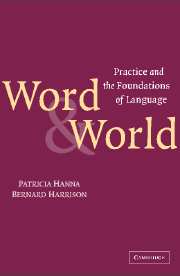11 - Unnatural Kinds
Published online by Cambridge University Press: 05 June 2012
Summary
Universals
Does the universe contain, in addition to individuals, kinds and properties? This is the celebrated Problem of Universals. The traditional answers to it comprise Realism, which posits kinds and properties in addition to their individual exemplars and instances, and Nominalism, which allows the existence only of individuals. There is also a third answer, Conceptualism, which, recoiling both from the absurdities of an outright Nominalism and from the over-richly peopled universe of the Realist, assigns to kinds and properties the refuge of a shadowy existence as mental templates, or rules, for shuffling individuals into the sets, or as logicians say, extensions, associated with kind-names.
Realism was born with Plato. Nominalism, despite the efforts of Nelson Goodman or Hartry Field, is widely regarded as having died with Hobbes. The analytic tradition in philosophy has tended until very recently to alternate uneasily between the options of Conceptualism and some kind of platonic or quasi-platonic Realism. The Realism recommended both by Frege and by the early Russell was of this kind.
Thoughts, Frege agrees with Plato, are eternal, immutable essences which are neither created, nor sustained, nor in any way altered by any human activity; nor are they perceivable by any human sense. And so, Frege concludes, they exist neither in the external material world, nor in the subjective inner world: “a third realm must be recognized.”
“Third realms” and their contents sit ill, however, with the Positivism-derived naturalism and empiricism of so much analytic philosophy.
- Type
- Chapter
- Information
- Word and WorldPractice and the Foundations of Language, pp. 231 - 260Publisher: Cambridge University PressPrint publication year: 2003



